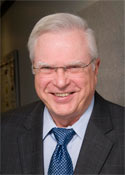March 11, 2009
Bioethicist to explore ‘The Puzzles of Pedophilia’
CARBONDALE, Ill. -- Attorney and research psychoanalyst William J. Winslade will explore a variety of issues dealing with pedophilia when he presents the 2009 John & Marsha Ryan Bioethicist-in-Residence lecture at the Southern Illinois University School of Law Center for Health Law and Policy.Winslade will discuss “The Puzzles of Pedophilia: Unanswered Questions and Problematic Policies,” at 5 p.m., Wednesday, March 18, in the courtroom of the Hiram H. Lesar Law Building at Southern Illinois University Carbondale.
In addition to presenting the lecture at SIUC, Winslade will meet with the combined ethics committees of Southern Illinois Healthcare -- Memorial Hospital of Carbondale, Herrin Hospital and St. Joseph Memorial Hospital -- to discuss the topic of medical treatment of handicapped newborns on Thursday, March 19. He will meet with students at the SIU School of Medicine in Springfield on Friday, March 20.
The lecture is free, and the public is welcome, but organizers recommend pre-registration. To register, e-mail the law school’s Center for Health Law and Policy at chlp@siu.edu or call 618/453-8636.
Media Availability
Reporters and photographers are welcome to cover the lecture. Winslade will be available to speak with the media at 4:30 p.m., prior to the lecture. To make arrangements for interviews or for more information on the lecture, contact Alicia Ruiz, the law school’s director of communications and outreach, at 618/453-8700.
Prior to the lecture, the public can watch a 60-minute British Broadcasting Corp. documentary that Winslade was involved with that explores the medical treatment of sex offenders. The film, “The Castration Cure,” begins at 3:30 p.m. in the law school auditorium. The film looks at the ethical and legal implications of castration and relates directly to the lecture.
Winslade is the James Wade Rockwell Professor of Philosophy of Medicine at the Institute for the Medical Humanities at the University of Texas Medical Branch at Galveston. He also holds a dual appointment at the University of Houston’s Health Law and Policy Institute.
Marshall B. Kapp, health law center co-director and Garwin Distinguished Professor of Law and Medicine, expects Winslade to focus on what the legal system can learn from mental health professionals about pedophilia, and what the legal system can do to improve the mental health process regarding issues that surround pedophilia.
The lecture will look at the continuing uncertainty over what causes pedophilia, according to organizers. An event brochure states, “diagnoses are elusive, treatments seem ineffective, and neither imprisonment nor involuntary hospitalization provides satisfactory solutions.” In addition, the voluntary chemical castration statute in Texas for incarcerated pedophiles shows why the problems seem impossible to solve, Kapp said.
Kapp and W. Eugene Basanta, health law center co-director and the Southern Illinois Healthcare Professor of Law, said society really has not come up with other ways to prevent pedophiles from repeating the behavior. There are also conflicting ethical questions as to whether society should offer pedophiles the option of chemical castration as a key to getting out of prison, or if such a procedure is an intrusion to a person’s civil liberties.
“This is an illustration of how law ethics and mental health issues intersect in a way that is important to society,” Kapp said.
A number of other states are considering using voluntary chemical castration on pedophiles, Basanta said.
The issues surrounding treatment and legal issues involving pedophiles raises questions of interest to anyone concerned not only with law and mental health, but also the well being of children, safety, and society, Kapp said. The lecture is for a variety of audiences, including child welfare specialists, attorneys, medical professionals, law enforcement, and parents.
“This is an area where I think there will be a lot of interest,” Basanta said.
Winslade holds a doctorate in philosophy from Northwestern, a law degree from the UCLA Law School, and a doctorate in psychoanalysis from the Southern California Psychoanalytic Institute. His is the author of the 1998 book, “Confronting Traumatic Brain Injury: Devastation, Hope and Healing,” and is currently writing, “The Birth, Life, and Death of the Brain: Legal and Ethical Perspectives,” with Stacey A. Tovino, as associate professor and director of the Health Law and Policy Center at Drake University Law School.
Winslade’s biography notes he recommends banning boxing, enacting bicycle and motorcycle helmet laws for adults and children, raising the legal driving age to at least 19, and requiring annual driving tests for everyone 65 and older.
Founded in 2006, The John & Marsha Ryan Bioethicist in Residence supports an annual residence and lecture by a law or medicine ethics scholar for the SIU schools of law and medicine. The selected presenter visits classes at both schools and organizes interdisciplinary educational activities for students, residents and faculty. The presenter also interacts with students and offers a public lecture on their scholarship as it relates to law and medicine.
For more information on the lecture, contact Alicia Ruiz, the law school’s director of communications and outreach, at 618/453-8700.

